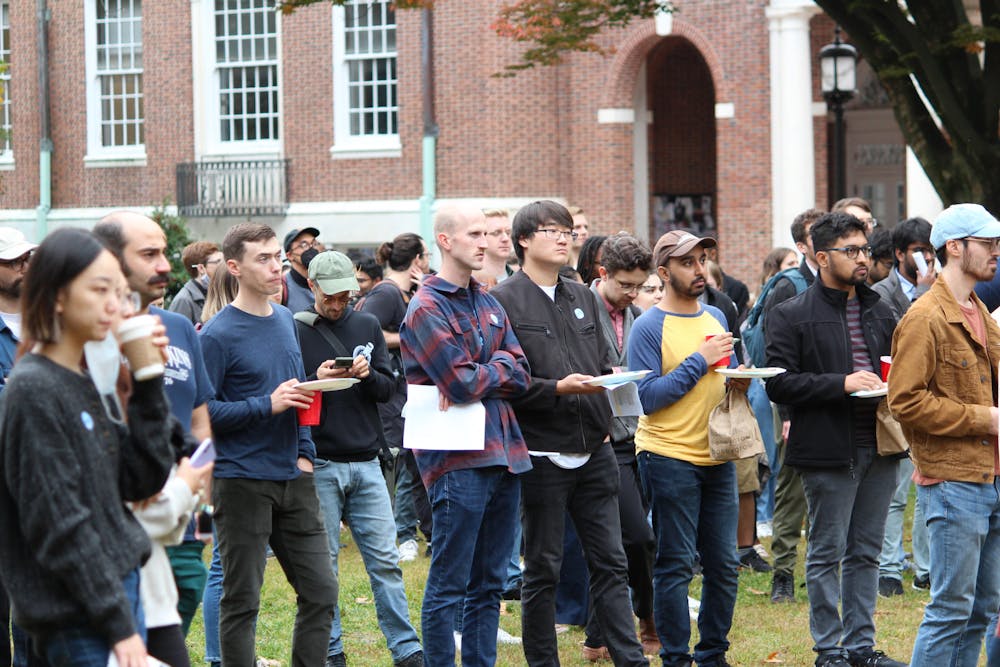After years of struggling with the University and barely improving working conditions, almost 3,200 doctoral students at Hopkins are finally voting to form a graduate student worker union. This is the culmination of years of organizing for a living wage, protections for international students, fair grievance procedures and so much more that graduate workers need to lead a dignified life.
These concerns have continued to go unaddressed, and graduate workers are now saying that enough is enough. Unionization is our opportunity to be treated as equals by negotiating a contract that guarantees research and teaching conditions that will allow graduate student workers, and in turn, this University, to thrive.
Why would we go through the trouble of forming a union? The answer is simple. We do not feel valued.
Over the years, Hopkins administration has failed to prioritize its doctoral students. After almost a decade, the minimum Krieger School of Arts and Sciences stipends were raised to $34,500 this fall. Despite the raise, these stipends remain below the cost of living in Baltimore, affecting how graduate students can do their research and teaching.
In fact, most schools do not even have a system of raising salaries each year to account for inflation. We have colleagues in the world-renowned Bloomberg School of Public Health being given stipends as low as $26,000 per year.
With such pride in being the first research university in the U.S. and topping the U.S. rankings in research spending for 43 years, one would expect the University to set an example and spend its money on paying the people who actually run the labs and produce the research output that it is so proud of.
However, up until 2018, its graduate students did not have vision and dental health insurance as part of their support package. Furthermore, every year Hopkins fails to pay its graduate students on time, despite several attempts to demonstrate late pay issues through testimonials from more than 100 students across the School of Medicine, School of Public Health and Whiting School of Engineering over the last few years.
It is simply a tragedy that graduate workers have been treated so unfairly at Hopkins while the University rakes in hundreds of millions of dollars in surplus annually.
Founded in 2014, Teachers and Researchers United (TRU) has made significant gains in addressing graduate worker needs, including campaigning for better health insurance and childcare packages for its graduate students. TRU also supported such movements as JHToo, which was formed to support survivors of sexual assault and hold the University accountable for mishandled cases.
Similar movements of graduate worker unionization have swept the country over the last few years. As this wave of higher education organizing has grown, doctoral students at Yale University, Northwestern University, Boston University and Massachusetts Institute of Technology among others, have recently won union elections and their bargaining units have started (or will soon start) negotiations with their universities.
Since the University’s undergraduate program is consistently ranked in the top 10 in the U.S. and competes with the likes of the above universities, it's about time it treats its doctoral students with the respect that we deserve, too.
What lies ahead?
The administration has failed to live up to the standards of which it so eloquently boasts. It has shown us that demands from graduate students on campus will go unheard unless we stand up for our rights.
Today, we vote. We let Hopkins know what its graduate students think about their working conditions.
Ultimately, our unionization effort is one of hope — hope that our academic spaces will nurture healthy and safe working conditions, that every doctoral student can carry out excellent research without worrying about their bank statements and that we are treated with the respect that we deserve.
We are manifesting a future in which Hopkins treats its workers with respect and invests in what truly allows it to run: its graduate student workers. Join us by voting TRU-UE YES on Jan. 31.
Ali Siddiqui is a fifth-year doctoral candidate in the Department of Earth and Planetary Sciences.
Kristin Brig-Ortiz is a sixth-year doctoral candidate in the Department of the History of Medicine.





